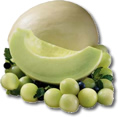This page has been archived and is being provided for reference purposes only. The page is no longer being updated, and therefore, links on the page may be invalid.
Read the magazine story to find out more. |
|
|
Pitting Microbe Against Microbe for Safer Foods
By Rosalie Marion BlissMarch 16, 2007
Before fresh fruit is cut, it's important that the outer skin be kept free from foodborne pathogens. That's because food-contaminating microbes on the surface of a peel or rind could piggyback onto a cutting knife and be dragged into the fruit's flesh.
Agricultural Research Service (ARS) scientists have led a team that tested a combination of bacterial enemies that effectively controlled Listeria monocytogenes on fresh-cut honeydew melon pieces during exposure tests.
L. monocytogenes is a foodborne human pathogen—widely distributed in nature—that tolerates environmental stress, multiplies at low temperatures and survives refrigeration. It can cause serious infections. And federal agencies have established a zero-tolerance for L. monocytogenes in processed, fresh-cut fruits and vegetables.
William Conway, with the ARS Produce Quality and Safety Laboratory at Beltsville, Md., and Wojciech Janisiewicz, with the ARS Appalachian Fruit Research Station at Kearneysville, W.V., led the study. They worked in cooperation with Baltimore, Md.-based Intralytix, Inc.
To test bacteria-fighting potential, the researchers treated honeydew melon pieces with three different protective solutions: either an oxidative bacterium known as Gluconobacter asaii, a mixture of six L. monocytogenes-specific bacteriophages or a combination of both.
The G. asaii bacteria are naturally present on the surface of pome fruits, such as apples and pears, and are nontoxic to humans. Bacteriophages are viruses that, while nontoxic to humans, kill specific human bacterial pathogens.
After artificially contaminating the test honeydew pieces with L. monocytogenes, the team found that the combination of phages and G. asaii bacteria was the most effective treatment. It reduced L. monocytogenes populations by more than 99.9 percent.
Read more about the research in the March 2007 issue of Agricultural Research magazine.
ARS is the U.S. Department of Agriculture's chief scientific research agency.

